The L Word Creator Ilene Chaiken: ‘The Storytellers Have Got To Tell the Story’
Reflecting on representation between iterations of The L Word, the creator stresses the value of telling LGBTQ+ stories to build community if not "changing hearts and minds."
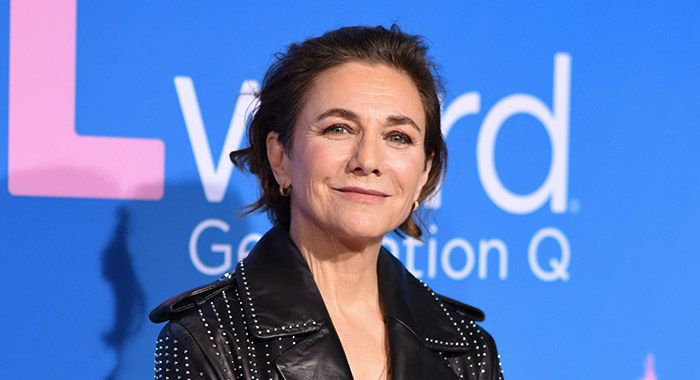
(Photo by Robyn Beck/AFP via Getty Images)
Pride Month Showrunner Spotlight: In June, Rotten Tomatoes will feature LGBTQ+ series creators and writers sharing their perspectives on representation on television and streaming, who inspired them, how the environment has improved, and where there’s still more work to be done.
After working as a coordinating producer for The Fresh Prince of Bel-Air and writing feature scripts in the ’90s, Ilene Chaiken created the landmark LGBTQ+ series The L Word, which also spawned a reality series The Real L Word. Ten years after The L Word ended, Chaiken helped new showrunner Marja-Lewis Ryan update it in The L Word: Generation Q. In between, Chaiken has worked on shows as diverse as Empire and Law & Order: Organized Crime.
For Pride Month, Chaiken spoke with Rotten Tomatoes while she’s developing new shows to discuss the importance of LGBTQ+ representation and some inspiring examples of it on television from the past and present.
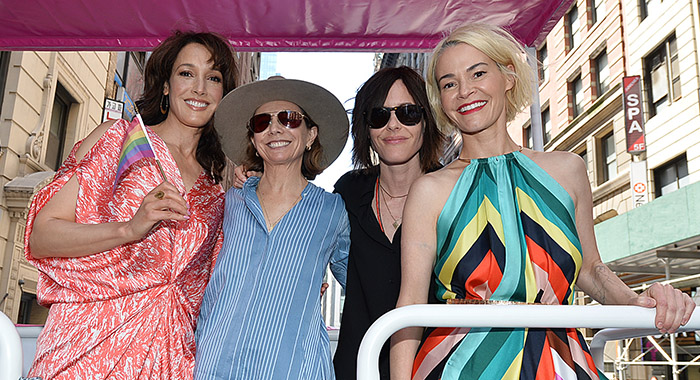
(Photo by Anthony Behar/Showtime)
Fred Topel for Rotten Tomatoes: How important is LGBTQ+ representation in the entertainment industry in today’s political and social climate?
Ilene Chaiken: As important, if not more important than it’s ever been given today’s political and social climate. We’ve known this for quite some time — and I’m sure you have and I’m sure other people you’ve spoken to have — but I’m hearing it more and more from the political sector, which is [saying]: “God, we don’t know what to do. We are facing this enormous backlash. We’re losing ground, and really the only thing we can think of is that we’ve got to tell the story better, and you, the storytellers, have got to tell the story for us.”
Do you feel that pressure as a creator?
Chaiken: I don’t feel it as pressure. I certainly feel it as an important responsibility and obligation, a privilege, a wish. I don’t feel pressure.
Are you hopeful that, while states keep proposing anti-gay and anti-trans legislation, the work you and your colleagues are doing can get through to the right people and make a difference?
Chaiken: I hope so. These are tough, very divisive times, and I don’t know who we’re getting through to, but I have no doubt that we need to keep telling these stories. If we’re not changing hearts and minds right now, we’re reaching out to provide community to people that are having a particularly tough time in the face of these — I’ll just call them “backlashes.”
That’s true. Even if entertainment can’t directly influence politics, is one positive that you can show the targets of this backlash that they’re not alone?
Chaiken: Absolutely, those are two really important facets of what we do. Hopefully in addition to those social justice missions that we undertake, we also are providing some good entertainment and some joy.
How have you seen representation change in filmed entertainment since you began working?
Chaiken: Well, there’s certainly much more representation. We are certainly more present, more represented. Our stories are being told in the context of many other stories and genres. And also, we’re represented with more diversity and more complexity than we had been in the past.
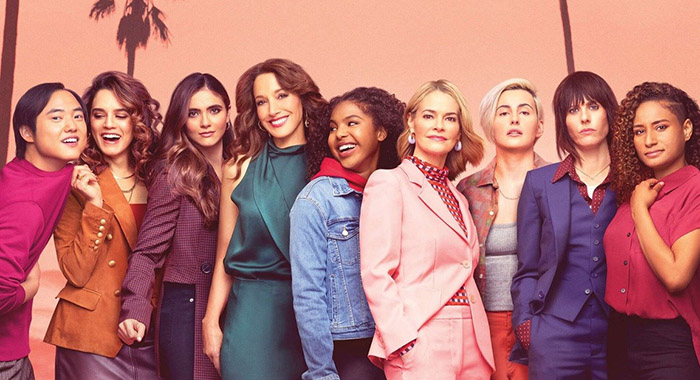
(Photo by Showtime)
Did you see that grow in real time between the The L Word and The L Word: Generation Q?
Chaiken: I absolutely did. I would say that when The L Word first went off the air, I was expecting — not because of The L Word, but just because of the culture — that there would be a great many more shows that told LGBTQ+ stories, and I was at first disappointed and disheartened that we weren’t seeing it. Then that changed, not all at once, but in the aggregates of year after year after year. I felt like there were more stories and more projects and shows that represented us and being told from lots of different points of view.
What TV series do you look to for inspiration? Which ones do a good job representing the LGBTQ+ community?
Chaiken: One of my favorite shows of the last couple years was Killing Eve. I wouldn’t say that represents the community, but it was a delicious diversion for us. Pose was a breakthrough.
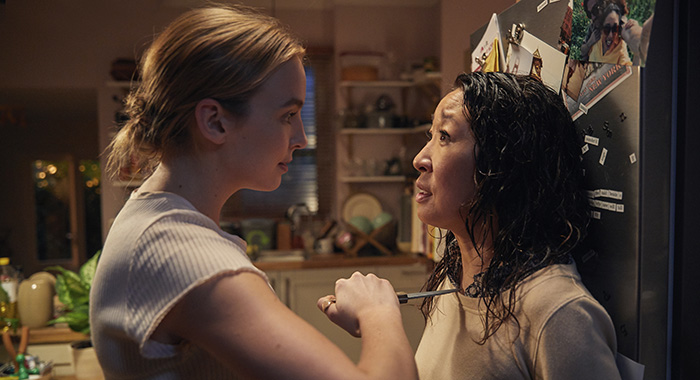
(Photo by BBC America)
Which artists or creators from the LGBTQ+ community who inspire you?
Chaiken: My references might be considered old school, but Ryan Murphy certainly inspires me. I love what he does, but both Ryan Murphy and Shonda Rhimes have been representing for such a long time and never failed to. I know there are some new young filmmakers I really respect and admire. They’re out there.
Has the ability to shepherd a new showrunner like Marja-Lewis Ryan to tell new stories invigorated you to find new ways to tell stories?
Chaiken: Absolutely. It’s really important to me. I love mentoring and shepherding new talent and extending a hand or whatever metaphor you want to use for more people to step up and tell more stories.
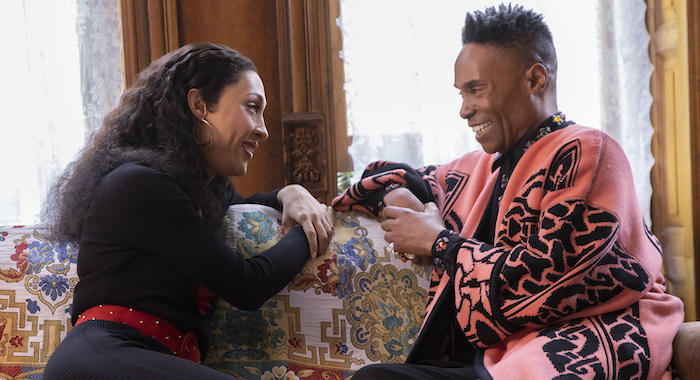
(Photo by Eric Liebowitz/FX)
When did you start seeing trans and nonbinary stories being included in the LGBTQ+ stories being told?
Chaiken: Obviously Transparent and Pose were both milestones. We tried to tell trans stories before we understood trans identity and made some missteps, but I would say that Transparent was a very important show for representation of trans lives and experience. And also the beginning of an understanding and this is an evolving understanding, that in large part trans stories should be told by and with the close collaboration of trans writers and filmmakers…I don’t mean to exclude anyone or say you can’t tell these stories if you’re not this or that, but I do think we’ve learned how important it is to have people represent their own lives and experiences in film and television.
When you say we made some missteps, do you mean on The L Word?
Chaiken: Yes, I do.
What would you have done differently looking back?
Chaiken: I wouldn’t have done anything differently, but I recognize that our representation of Max lacked some understanding. I think it was of its time and it was from research that we did. We didn’t do it glibly or halfheartedly. We represented what we understood and what was conveyed to us, but I didn’t have any writers on that staff who identified as trans. They might have done a better job or a different job of representing Max.
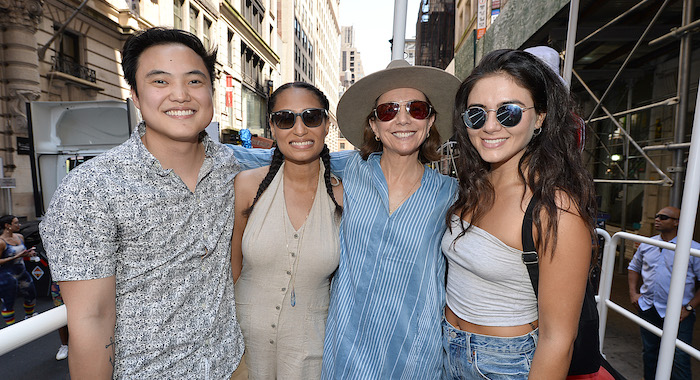
(Photo by Anthony Behar/Showtime)
And now you have Leo Sheng as Micah on Generation Q.
Chaiken: Absolutely. And Marja also has among her writing colleagues at least one, and I think probably more, trans and nonbinary writers.
Do your upcoming projects also include LGBTQ+ themes and representation?
Chaiken: Absolutely. Everything that I do has queer characters. Even when we’re doing Law & Order, there are queer characters. But my next couple of projects — I’m right now working on my own stories and those stories are overwhelmingly queer. They haven’t been announced yet. I’m just writing at the moment, and I tend to not announce projects until they’re going.






